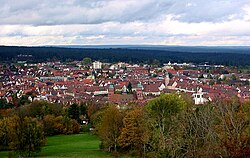You can help expand this article with text translated from the corresponding article in German. (May 2021) Click [show] for important translation instructions.
|
Freudenstadt | |
|---|---|
 | |
Location of Freudenstadt within Freudenstadt district  | |
| Coordinates: 48°27′48″N 8°24′40″E / 48.46333°N 8.41111°E | |
| Country | Germany |
| State | Baden-Württemberg |
| Admin. region | Karlsruhe |
| District | Freudenstadt |
| Government | |
| • Mayor (2024–32) | Adrian Sonder[1] (CDU) |
| Area | |
| • Total | 87.58 km2 (33.81 sq mi) |
| Elevation | 732 m (2,402 ft) |
| Population (2022-12-31)[2] | |
| • Total | 24,301 |
| • Density | 280/km2 (720/sq mi) |
| Time zone | UTC+01:00 (CET) |
| • Summer (DST) | UTC+02:00 (CEST) |
| Postal codes | 72250 |
| Dialling codes | 07441, 07442, 07443 |
| Vehicle registration | FDS, HCH, HOR, WOL |
| Website | www |

Freudenstadt (German pronunciation: [ˈfʁɔɪ̯dn̩ˌʃtat], Swabian: Fraidestadt) is a town in Baden-Württemberg in southern Germany. It is the capital of the district Freudenstadt. The closest population centres are Offenburg to the west (approx. 36 km away) and Tübingen to the east (approx. 47 km away).
The city lies on a high plateau at the east edge of the north Black Forest, and is well known for its fresh air. Its city centre is famous as the largest market place in Germany. After Horb, it is the second largest city of the Freudenstadt district. The city has an administration partnership with the communities Bad Rippoldsau-Schapbach and Seewald.
Freudenstadt is a climatic health resort of international renown. In the 19th and 20th centuries, visitors of note included George V of the United Kingdom, the Queen of Sweden, John D. Rockefeller, and the American writer Mark Twain. With its many hotels and guest houses, and its high-class cuisine, Freudenstadt remains a popular vacation spot for Germans from every part of the country. Among the many Germans of note who considered Freudenstadt a second home was the justice inspector Friedrich Kellner whose WWII diary is the subject of a Canadian documentary.
- ^ Oberbürgermeisterwahl Freudenstadt 2024, Staatsanzeiger. Retrieved 12 June 2024.
- ^ "Bevölkerung nach Nationalität und Geschlecht am 31. Dezember 2022" [Population by nationality and sex as of December 31, 2022] (CSV) (in German). Statistisches Landesamt Baden-Württemberg. June 2023.


